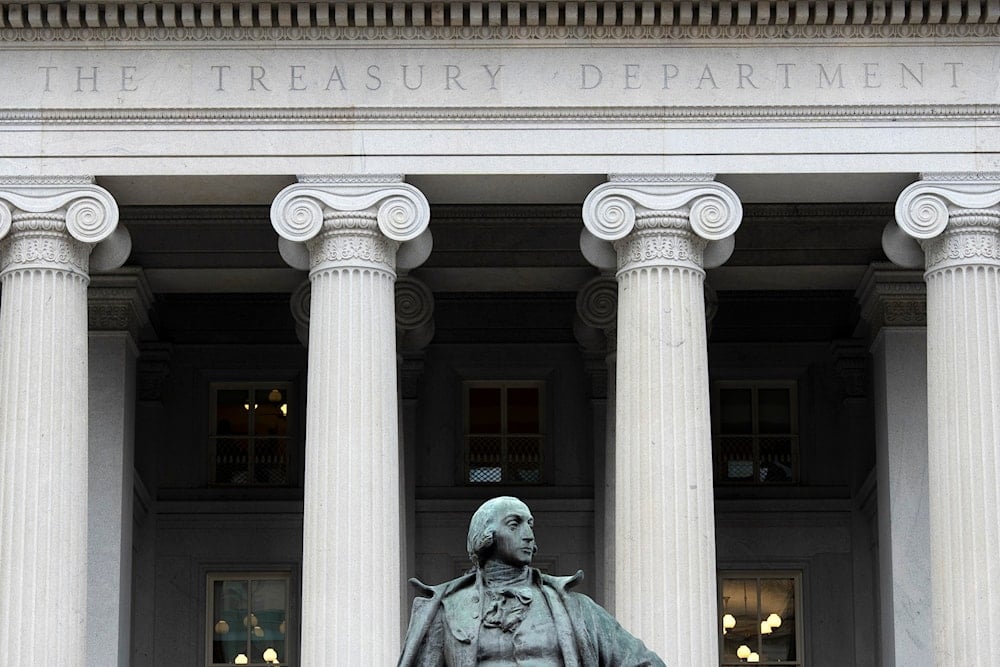US deficit hits $291bln in July despite higher tariffs
The US budget deficit rose 19% in July 2025 to $291 billion, with record federal spending and a sharp increase in customs duty revenues from Donald Trump’s tariffs, Treasury data shows.
-

The Treasury Department building is seen, March 13, 2025, in Washington. (AP)
The US government's budget deficit expanded by almost 20% in July, reaching $291 billion, even as customs duty revenues surged by nearly $21 billion due to President Donald Trump's tariffs, according to a Tuesday report from the Treasury Department.
In July, the US government's deficit increased by 19%, or $47 billion, compared to the same month in 2024, with monthly receipts rising by 2%, or $8 billion, to reach $338 billion, while outlays surged by 10%, or $56 billion, hitting a record high of $630 billion for the month.
This July had fewer business days compared to the same period last year, and according to the Treasury Department, if this calendar difference were accounted for, receipts would have been approximately $20 billion higher, which would have narrowed the deficit to around $271 billion.
A Treasury official noted that net customs receipts in July surged to roughly $27.7 billion, up sharply from approximately $7.1 billion in the same period last year, driven by the higher tariff rates implemented under President Donald Trump, with the collections showing consistent growth since April and remaining broadly in line with the rise seen in June's customs receipts.
The US pays the price of Donald Trump's tariffs
US President Donald Trump has frequently highlighted the billions of dollars generated for the US Treasury through his tariffs, though these duties are actually paid by importing companies, with a portion of the costs frequently being transferred to American consumers through increased prices.
Tuesday's consumer price index report revealed rising prices for tariff-affected goods such as furniture, footwear, and auto parts, though these increases were balanced by declining gasoline prices in the broader index, while data for the first ten months of the fiscal year showed customs duties reaching $135.7 billion, a $73 billion or 116% jump compared to the same period last year.
The cumulative fiscal year budget figures revealed a $1.629 trillion deficit, marking a 7% increase, or $112 billion, over the previous year. Receipts have climbed 6% marking a $262 billion rise to reach a record $4.347 trillion for the ten months, while expenditures expanded by 7%, a $374 billion jump, to hit another ten-month high of $5.975 trillion.
Rolling back tariffs could trigger Depression-era crisis
Meanwhile, the Trump administration has cautioned a federal appellate court that reversing its broad tariff policies could potentially destabilize the economy to a degree comparable to the 1929 Great Depression, jeopardizing vital social safety net programs, including Social Security and Medicare.
The US Court of Appeals for the Federal Circuit is reviewing whether Trump overstepped his authority under the 1977 International Emergency Economic Powers Act by imposing "Liberation Day" tariffs, with arguments centered on whether the trade measures align with the law's original intent to address national emergencies.
The dispute originated when small businesses and a group of 12 Democratic state attorneys general sued, arguing the International Emergency Economic Powers Act doesn't grant presidential authority to unilaterally alter trade policy. After the US Court of International Trade ruled most of Trump's tariffs illegal under IEEPA in May 2025, the Federal Circuit temporarily suspended the decision, permitting the tariffs to stay in place during appeals.

 3 Min Read
3 Min Read









